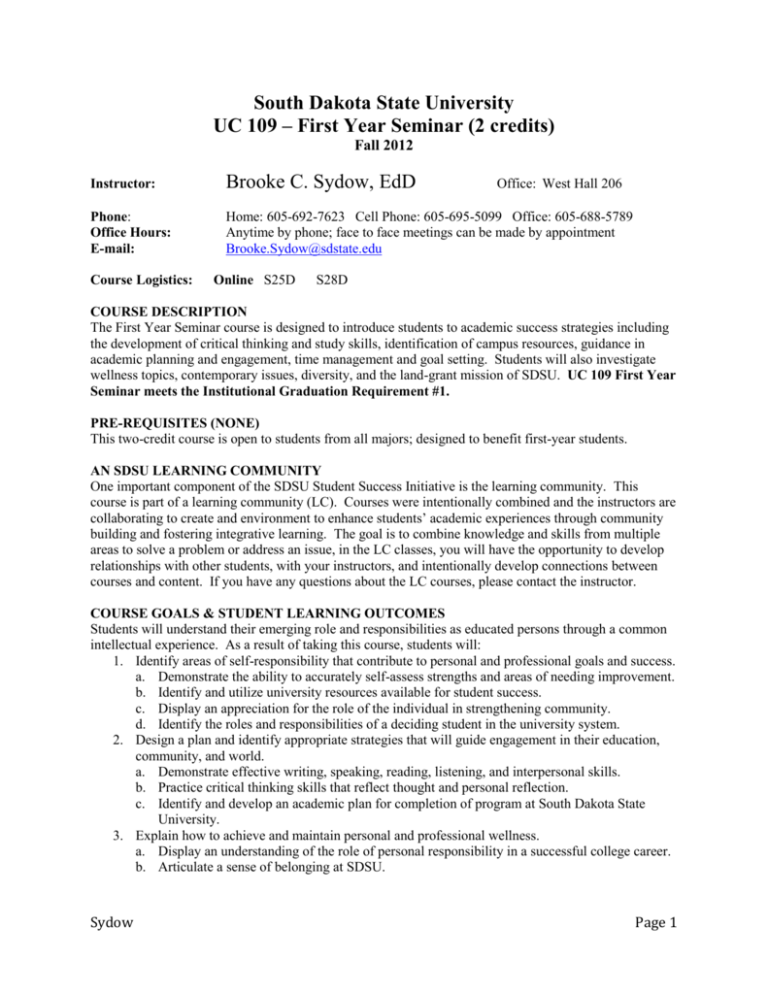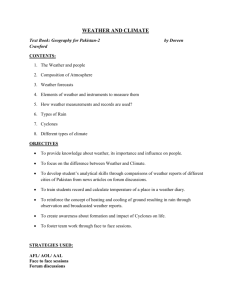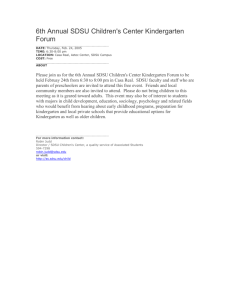South Dakota State University UC 109 – First Year Seminar (2 credits)
advertisement

South Dakota State University UC 109 – First Year Seminar (2 credits) Fall 2012 Instructor: Brooke C. Sydow, EdD Phone: Office Hours: E-mail: Home: 605-692-7623 Cell Phone: 605-695-5099 Office: 605-688-5789 Anytime by phone; face to face meetings can be made by appointment Brooke.Sydow@sdstate.edu Course Logistics: Online S25D Office: West Hall 206 S28D COURSE DESCRIPTION The First Year Seminar course is designed to introduce students to academic success strategies including the development of critical thinking and study skills, identification of campus resources, guidance in academic planning and engagement, time management and goal setting. Students will also investigate wellness topics, contemporary issues, diversity, and the land-grant mission of SDSU. UC 109 First Year Seminar meets the Institutional Graduation Requirement #1. PRE-REQUISITES (NONE) This two-credit course is open to students from all majors; designed to benefit first-year students. AN SDSU LEARNING COMMUNITY One important component of the SDSU Student Success Initiative is the learning community. This course is part of a learning community (LC). Courses were intentionally combined and the instructors are collaborating to create and environment to enhance students’ academic experiences through community building and fostering integrative learning. The goal is to combine knowledge and skills from multiple areas to solve a problem or address an issue, in the LC classes, you will have the opportunity to develop relationships with other students, with your instructors, and intentionally develop connections between courses and content. If you have any questions about the LC courses, please contact the instructor. COURSE GOALS & STUDENT LEARNING OUTCOMES Students will understand their emerging role and responsibilities as educated persons through a common intellectual experience. As a result of taking this course, students will: 1. Identify areas of self-responsibility that contribute to personal and professional goals and success. a. Demonstrate the ability to accurately self-assess strengths and areas of needing improvement. b. Identify and utilize university resources available for student success. c. Display an appreciation for the role of the individual in strengthening community. d. Identify the roles and responsibilities of a deciding student in the university system. 2. Design a plan and identify appropriate strategies that will guide engagement in their education, community, and world. a. Demonstrate effective writing, speaking, reading, listening, and interpersonal skills. b. Practice critical thinking skills that reflect thought and personal reflection. c. Identify and develop an academic plan for completion of program at South Dakota State University. 3. Explain how to achieve and maintain personal and professional wellness. a. Display an understanding of the role of personal responsibility in a successful college career. b. Articulate a sense of belonging at SDSU. Sydow Page 1 COURSE GOALS & STUDENT LEARNING OUTCOMES (Continued) 4. Articulate how knowledge of contemporary issues and exposure to diversity impacts personal and professional life. a. Demonstrate an understanding of the role of community and respect for varying experiences and perspectives in the development of a successful society. 5. Explain how South Dakota State University is defined by the Land Grant Mission (Morrill Act). a. Develop an understanding of the history, traditions, and mission of SDSU and University College. In addition to meeting the Student Learning Outcomes for IGR #1, this course focuses on the following objectives on the IDEA Student Evaluation of Teaching survey that is administered each semester: IDEA Objective #5 – Acquiring skills in working with others as a member of a team IDEA Objective #9 – Learning how to find and use resources for answering questions or solving problems IDEA Objective #10 – Developing a clearer understanding of, and commitment to, personal values DESIRE2LEARN (D2L) This course is delivered via Desire2Learn (D2L). Students are expected to access D2L regularly for course up-dates, discussions, assignment specifics, and assignment submittal. When submitting assignments through the dropox, always use a WORD documents. https://d2l.sdbor.edu/index.asp COMMON READ This course is participating in the 2012-2013 University Common Read Program. For important dates and information access the Common Read website regularly. http://www3.sdstate.edu/honors/commonread/index.cfm REQUIRED EMAIL Communication will be expected between instructor and student via the student’s “Jacks” e-mail account, as well as D2L email. You must activate your “Jacks” email account immediately. This account is the official means of communication for SDSU. To activate your account, follow the link below for instructions. https://mystateonline.sdstate.edu . REQUIRED TEXTS & ONLINE RESOURCES UC 109 - First Year Seminar customized text (only available at the SDSU bookstore) SDSU Common Read text: The Absolutely True Diary of a Part-Time Indian by Sherman Alexie StrengthsQuest Access Code (available at the Cashier’s desk in the SDSU bookstore and online for purchase.) SUPPLEMENTAL MATERIALS You will be expected to apply what you are learning through practice. This may require you to take notes, access the internet, campus or online resources, and a local newspaper. It is recommended that you keep all course materials in a three ring binder or folder throughout the semester for organization. Sydow Page 2 INSTRUCTIONAL METHODS Since this course is completely online, the delivery method will be through D2L. This course will be enhanced using multiple formats including audio ‘lecture’, written documents, large and small group discussion, guest speakers and tours, out-of-class events, group work, presentations, and written assignments. Students will be expected to communicate to complete group projects and attend campus or community events. Active preparation is required. It is expected that you will turn in assignments and have readings completed by the due date indicated in content. In order to learn, you must engage. PARTICIPATION & REQUIRED ATTENDANCE In a face to face UC 109 course, classroom attendance is required. In this online class, ‘required attendance’ means making sure you post initial discussions by Thursdays no later than 10 PM, and responding to your group members no later than Sundays at 10 PM. Even though we will not meet face to face, your continual participation is required and graded. Participation means turning assignments in on time, ‘listening’, participating, and discussing course content with your fellow classmates. Participation, Discussions, & Case Studies are graded, which equals 20% of the overall course. MAKE-UP POLICY Assignments are expected to be turned in using the D2L DROPBOX by 10:00 pm on the due date specified on the Course Schedule. Late assignments will be accepted for partial credit (no more than 50%) at the discretion of the instructor. Only when the instructor is contacted in advance will you be allowed to turn in an assignment late. Communication is the key to the instructor/student relationship. It is your job to initiate and advocate for your own personal success. ASSIGNMENT FORMAT All assignments are required to be typed using 12 point Times New Roman font. Margins should be set at 1 inch on all four sides. Please use the following heading: Title of Assignment UC 109 - First Year Seminar Student Name Section # (Online) ASSIGNMENT REQUIREMENTS Students will be expected to access D2L on a regular basis for assignment information, class updates, assessment rubrics, and university event opportunities. Create this habit immediately. For all required assignments you will be provided an assignment sheet indicating the assignment purpose, objectives, specifications, and the assessment expectations. The assignment guidelines will be posted in D2L under “Content” on the course’s home page. Assessment rubrics will also be provided via D2L. Printing these assignment sheets and rubrics is encouraged and would be beneficial to your overall success in the course. Please Note: Some assignments will be for a percentage grade, while others will be pass/fail. Pass fail assignments will be crucial to passing the course. If you do not complete one of the pass/fail assignments, you will not pass the course. Sydow Page 3 BRIEF ASSIGNMENT DESCRIPTIONS: Completion of the following assignments will be required to pass UC 109: CSFI The College Success Factors Index (CSFI) is a pre/post survey that assesses students’ patterns of behavior and attitudes in areas that have been proven by research to affect student outcomes for success in higher education. These areas include: Responsibility vs. Control, Competition, Task Precision, Expectations, Wellness, Time Management, College Involvement, and Family Involvement. Students will reflect upon their growth in these areas in their Final Portfolio. Students will complete this assessment online. Advising Assignment The goal of this assignment is to have students establish a relationship with their Academic Advisor. Advisor names and contact information can be found on WebAdvisor under “Student Profile.” Students are required to attend an advising appointment or session. If your advisor is in the First Year Advising Center, information regarding meeting dates and times will be provided in class. Be sure to “like” the First Year Advising Center’s Facebook page to stay updated on events and advising information. This resource will be helpful for all students. http://www.facebook.com/#!/firstyearsdsustudents StrengthsQuest Knowing personal strengths will assist students in successfully transitioning to the university. Students will complete the StrengthsQuest assessment by GALLUP online. Students will discuss and reflect upon their strengths informally and formally throughout the semester and in their final portfolio. Students will need to purchase a Strengths code at the SDSU Bookstore, or online. E-Chug Assessment & Reflection E-Chug is an online assessment that puts alcohol and tobacco use into perspective. Students will complete this assessment online. Results will be discussed in class anonymously. Students will be required to take the self-assessment at the following web address: https://interwork.sdsu.edu/echug2/?id=SDSTATE&hfs=true The following assignments will be individually evaluated by the instructor using an assignment rubric: Topic Responses & Journals Regularly, students will be given the opportunity to individually respond in writing to a prompt or activity provided by the instructor requiring students to internalize topics and construct original ideas. Many of the Topic Responses & Journals will require students to reflect and apply knowledge gained from textbook reading assignments. Examples of topics for Topic Responses & Journals include “What does it mean to be an educated person?” and “How does attending a land grant institution benefit you?” Resources Scavenger Hunt The goal of this assignment is to familiarize students with campus resources, both physical and online, that are available to them. Students will work in assigned groups to complete this assignment. At the completion of their hunt, each group will be responsible to professionally present one physical campus resource and one online resource to their peers. Engaging Experiences The goal of this assignment is to take ownership in becoming active, contributing university students engaging in reflection and discussion with peers regarding participation in general campus activities, as well as events based on the common read text and themes of diversity, empowerment, and service, and the Land Grant Mission. Students will attend events with a peer and create a professional display summarizing the events they attended and reflecting on what was learned and how it enhanced their university experiences. Displays will be presented in class on a date specified on the Course Schedule. Sydow Page 4 Discussions & Case Studies Students will be assigned discussion groups at the beginning of the semester. Each student will be required to lead the discussion group once. Case studies & discussion prompts will be provided and will focus on the different course topics as indicated on the Course Schedule. Student leaders will be expected to facilitate and foster the discussions. Points will be awarded for preparation and participation. Final Portfolio The purpose of this assignment is to provide students with the opportunity to synthesize the knowledge and experiences they gained through UC 109 - First Year Seminar and reflect upon their growth. A portfolio format will be required. Students will reflect on their transition to the university and develop a plan for future success based on concepts and strategies developed throughout UC 109. STUDENT LEARNING OBJECTIVES & ASSESSMENT As a result of taking the course, students will: 1. Identify areas of self-responsibility that contribute to personal and professional goals and success. 2. Design a plan and identify appropriate strategies that will guide engagement in their education, community, and world. 3. Explain how to achieve and maintain personal and professional wellness. 4. Articulate how knowledge of contemporary issues and exposure to diversity impacts personal and professional life. 5. Explain how South Dakota State University is defined by the Land Grant Mission (Morrill Act). Assessment Personal Assessments: StrengthsQuest & CSFI Final Portfolio Discussions & Case Studies Topic Responses & Journals Resources Scavenger Hunt Advising Assignment Engaging Experiences - Events & Display Discussions & Case Studies Topic Responses & Journals Personal Assessments: StrengthsQuest, CSFI, & E-Chug Discussions & Case Studies Final Portfolio Topic Responses & Journals Engaging Experiences - Events & Display Discussions & Case Studies Topic Responses & Journals Final Portfolio Topic Responses & Journals Discussions Engaging Experiences - Events & Display GRADING The final course grade is comprised of the following elements: Graded Assignments Topic Responses & Journals Engaging Experiences – Events & Display Participation, Discussions & Case Studies Resources Scavenger Hunt & Presentation Final Portfolio Advising Assignment College Success Factors Index Assessment StrengthsQuest E-Chug Assessment Sydow SLO 1, 2, 3, 4, & 5 2, 4, & 5 1, 2, 3, 4, & 5 2 1, 3, & 4 2 1&3 1&3 3 Total Points 100 100 100 100 100 Required Required Required Required Page 5 GRADING SCALE: Grades are based on a standard grading scale: A 90%-100% B 80%-89% C 70%-79% D 60%-69% F 59% and below ADA STATEMENT Any student who feels s/he may need an accommodation based on the impact of a disability should contact Nancy Hartenoff-Crooks, Coordinator of Disability Services (605-688-4504) to privately discuss your specific needs. The Office of Disability Services is located in room 065 in the Student Union. ACADEMIC INTEGRITY Students are expected to maintain high standards of academic integrity in all work for this course. Students are expected to do their own assigned work. The full policy is found in the Student Code (01:10:25) within the Student Policy Manual at http://studentaffairs.sdstate.edu/JudicialAffairs/StudentCode/Chapter10.pdf. Participating in an activity deemed as “academic dishonesty” under the SDSU Student Code will result in a minimum consequence of zero points on the assignment in question. A second offense will result in a minimum consequence of a zero in the course. FREEDOM IN LEARNING Students are responsible for learning the content of any course of study in which they are enrolled. Under Board of Regents and University policy, student academic performance shall be evaluated solely on an academic basis and students should be free to take reasoned exception to the data or views offered in any courses of study. Students who believe that an academic evaluation is unrelated to academic standards but is related instead to judgment of their personal opinion or conduct should first contact the instructor of the course. If the student remains unsatisfied, the student may contact the department head and/or dean of the college which offers the class to initiate a review of the evaluation. Sydow Page 6








